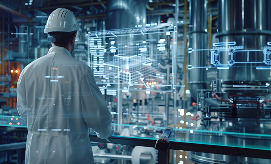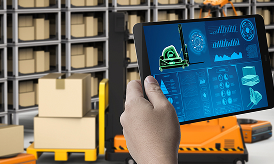Di WGS, kami memadukan pengetahuan teknis yang mendalam dengan wawasan industri untuk membantu bisnis menerapkan otomatisasi cerdas, mengoptimalkan operasional, dan membangun sistem berbasis AI yang scalable.
Kami mempercepat perjalanan AI Anda dengan menghadirkan solusi yang selaras dengan bisnis, siap produksi (production-ready), dan scalable sejak hari pertama.
Kami membantu mengotomatisasi tugas-tugas berulang dan manual, memungkinkan tim Anda untuk fokus pada inisiatif bernilai tinggi serta mendorong efisiensi operasional.
Kami merancang infrastruktur AI yang tidak hanya scalable dan tangguh, tetapi juga selaras dengan standar keamanan dan kepatuhan organisasi Anda.
Kami memungkinkan pengambilan keputusan yang lebih baik dan cepat dengan merekayasa sistem AI yang memberikan wawasan (insights) yang dapat ditindaklanjuti dari data Anda secara real-time.
Peran AI Engineer dalam Infrastruktur Digital Modern
AI Engineer adalah ahli multidisiplin yang menggabungkan pengembangan perangkat lunak, data science, dan machine learning untuk merancang sistem cerdas yang mampu belajar, beradaptasi, dan melakukan otomatisasi. Pekerjaan mereka mencakup seluruh stack digital, memecahkan tantangan kompleks, dan membuka nilai operasional.
Membangun kapabilitas AI secara internal sering kali membutuhkan keterampilan di luar pengembangan tradisional. Di situlah WGS hadir.
Menggunakan teknik machine learning seperti supervised learning, unsupervised learning, dan reinforcement learning, AI Engineer membangun algoritma yang mendasari kasus penggunaan seperti deteksi penipuan, segmentasi pelanggan, pemeliharaan prediktif, dan banyak lagi.
Kami mengubah model menjadi API yang scalable atau alat internal, memungkinkan akses yang mulus di seluruh sistem dan tim.
Kami merancang dan melatih model menggunakan pembelajaran terawasi, tak terawasi, dan penguatan untuk kasus penggunaan seperti deteksi fraud, peramalan permintaan, dan segmentasi pelanggan.
Engineer kami berkolaborasi dengan tim DevOps dan MLOps untuk membangun lingkungan yang aman dan scalable untuk men-deploy aplikasi AI.
Setelah di-deploy, model harus dipantau terus-menerus untuk akurasi, bias, dan kinerja, yang ditangani oleh AI Engineer dengan presisi.
Bersama AI Engineer WGS, kami dapat membantu mengotomatisasi operasi manual dan juga mengoptimalkan sumber daya perusahaan, dengan memanfaatkan kebijakan dan tata kelola perusahaan.

Mesin rekomendasi, optimalisasi harga, chatbot layanan pelanggan

Pemeliharaan prediktif, penjadwalan produksi

Diagnostik berbasis AI, triase pasien, pencitraan medis

Perdagangan algoritmik, penilaian risiko, anti-pencucian uang, deteksi penipuan, otomatisasi layanan pelanggan dengan KYC

Optimalisasi rute, otomatisasi armada, peramalan pengiriman, optimalisasi inventaris, manajemen stok, pelacakan real-time

Pengalaman pelanggan yang dipersonalisasi, layanan pelanggan otomatis, manajemen harga dan pendapatan, efisiensi operasional

Optimalisasi desain dan perencanaan, manajemen dan penjadwalan proyek, kontrol kualitas, pemeliharaan prediktif
Di tahun 2025 dan seterusnya, AI Engineer bukan lagi sekadar pelengkap (nice-to-have)—mereka sangat penting untuk tetap kompetitif. Dengan kemampuan unik mereka untuk mengintegrasikan, mengoptimalkan, dan menskalakan sistem AI, mereka memberdayakan bisnis untuk:
Bertindak lebih cepat dengan wawasan yang lebih baik
Mengurangi beban kerja manual
Meningkatkan penyampaian layanan
Membuka peluang baru untuk pertumbuhan